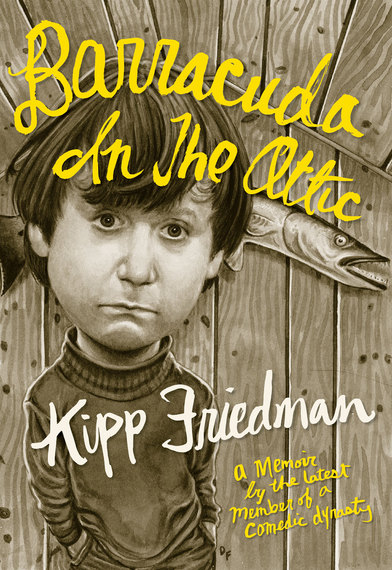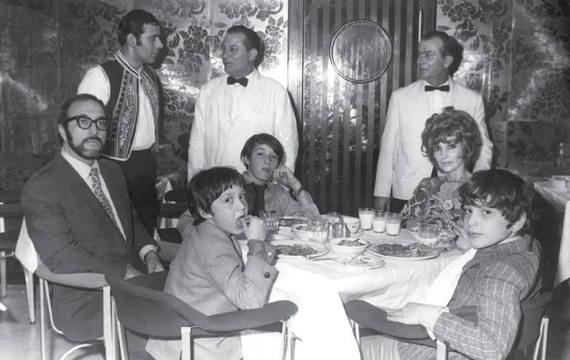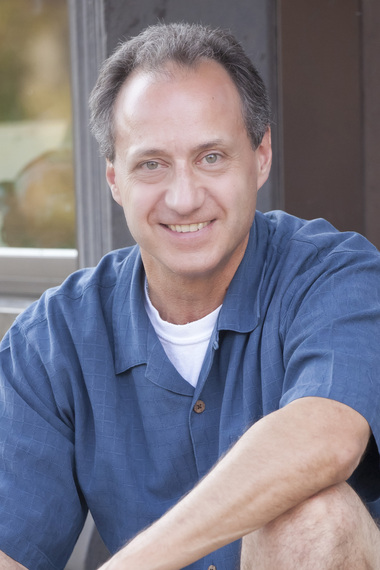Kipp Friedman is the youngest son of writer and satirist Bruce Jay Friedman. He is the author of a new childhood memoir, Barracuda in the Attic [Fantagraphics October 2013]
"I can write only from memory," the celebrated Russian writer Anton Chekhov once proclaimed, although I suspect even he would have benefitted somewhat from a tape recorder. "The subject must pass through the sieve of my memory, so that only what is important or typical remains, as on a filter." *
I'm no Chekhov -- let's get that straight! -- but I'd like to think I applied some Chekhovian (Pavlovian?) responses while writing about the amusing events and confounding encounters that shaped my early years.
The sieve by which my fleeting memories passed as through a filter were key events that stood out in my mind over time. For instance, how could I forget when at age six, while celebrating Passover Seder at my grandparents' apartment in the Bronx, my beloved grandfather Poppy (Irving Friedman) smiling at me while dangling a slimy matter between his pudgy fingertips?
"Kipp-ah, would you like the pipik?" asked my grandfather, using the Yiddish term for the belly button of a chicken. I must have recoiled in horror for the sound of warm laughter filled the room. The fact that this is the only memory I have of Poppy ever actually addressing me makes it stand out that much more and, in some ways, only enhances my memory of him and his impact on my life. I can easily recall his thick Bronx accent ("Kipp-ah" was his way of saying "Kipper"), his bald pate atop a perennial bronzed face (achieved from years of sunning himself in the bleacher seats at nearby Yankee Stadium) and his glowing, but often sad-looking brown eyes.
I once asked my father what he felt was the secret to good writing. I was about 16 and was struggling to complete a school English paper when I turned to my father for advice, he being the famous writer of the family. While I no longer recall what the paper was about, I do remember his response, though, mostly because of its brevity.
He thought for a moment and then said, "Specificity" and "Authenticity." His answer brought to mind young Benjamin Braddock in The Graduate when he was advised to go into "plastics." Of course, my father's writing advice was right (as was, it turned out, the advice on "plastics"). It's just that at the time I had hoped he would have been a little more descriptive (and secretly wished that he would even take a stab at helping me finish my paper).
Those two words -- "specificity" and "authenticity" -- would serve me well, however, while I set about recalling later in life the details that shaped my childhood. For instance, I clearly remember the time when my father rolled up his sleeve by a bedside lamp in 1968 to reveal an angry red crescent of teeth marks that had somehow wound up on his muscular bicep.
"Norman Mailer bit me at a party!" he said to my mother, while I stood by his side. "Maybe I should have it checked for rabies?" he joked, as my mother helped apply some ointment and a bandage to his arm. My father said Mailer had attacked him in a jealous rage over my father's recent success as a playwright. Of course, my mother asked the obvious question: "Did you bite him back?"
But, as I was soon to discover, being specific and authentic can sometimes take a back seat to the facts, especially when those "facts" are a bit murky.
My oldest brother Josh and I have a slight disagreement over who set an Amaretti cookie wrapper on fire and watched sheepishly as it hovered, zeppelin-like, in the direction of Woody Allen's head over at the next table at Elaine's. (Fortunately, the wrapper disintegrated into a wisp of dark smoke before impact.) The truth is, we all used to set the highly flammable pink, green and blue Italian cookie wrappers alight -- this was a neat trick our dad had taught us, regrettably, and we must have sat next to Woody Allen and his entourage at least three or four times in the mid-Seventies.
In memoir writing, unlike typical nonfiction and historical writing, one has a little latitude in which to fill the spaces. It's understood that the story is supposed to reflect the author's unique point of view. In this, I did my best to be as objective and truthful as possible, avoiding judgments, and letting my childhood memory speak for itself. Still, I shared my stories with family members, using them as fact-checkers whenever possible, and, in the back of my mind, hoped that no one would be offended or bothered by anything I wrote. (I have read of horror stories of memoirists who have alienated themselves from an entire generation of surviving family members -- even resulting in a spate of lawsuits and countersuits -- by exposing deep, dark family secrets.) Thankfully, in my case, no one (yet) has reacted in dismay: "You can't write that!" and there are no pending lawsuits. Although my oldest brother Josh sent me a note at one point, asking: "Did you have to write so much about the family?" to which my father amusingly responded, "It's a memoir. Should it just be blank pages?"
Lately, the Friedman family has seemingly established a cottage industry of family memoirs. My father released his "literary memoir" Lucky Bruce [Biblioasis] about two years ago, and my brother Josh wrote a childhood "autobiographical novel" several years back entitled Black Cracker [Wyatt Doyle Books from New Texture]. Even my middle brother Drew, the family's celebrated illustrator and cartoonist, has begun to touch upon subjects of an autobiographical nature in his more recent art work.
In each of my family members' autobiographical works, however, I make only brief cameo appearances and then disappear from the landscape. In Lucky Bruce, my father mentions me by name only once, in reference to a family trip to France in the summer of 1965. We arrived late at night and were apparently starving so we ordered pizza at a Vietnamese restaurant, which was the only restaurant still open.
"After biting into a slice, he cried out: 'This isn't pizza. There's no cheese in it,'" my father recalled. "Kipp was a quiet boy. Until that moment, we'd barely heard a peep out of him. But apparently the culinary setback had driven him over the edge." And with that sudden arrival I quickly vanished from the rest of his memoir, with only vague references to me and my brothers as "the boys."
In Josh's book, Black Cracker, I have even less of a presence, my name coming up two or three times in the background with Josh making a single reference to my being "tough" and "athletic" like him.
I clearly recognize myself, however, in one of my father's earlier works, his satirical self-help classic, The Lonely Guy's Book of Life. In the book's epilogue, appropriately entitled Whither the Lonely Guy, he poses the question: "Isn't it possible, then, in some way, to stop dead on a dime and become A Lonely Guy No More?" And then he answers his own question: "Sometimes life itself will lend a hand."
Lonely Guy (opening door): Jeremy! What are you doing here?
EX-SON (carrying a suitcase): Hi dad. I heard you were lonely. I'd like to spend my last year with you before going off to Furman U.
Lonely Guy: This is an awfully small place.
EX-SON (entering): Don't worry about it. You'll hardly even notice me. Where do I put my collection of Iggy and the Stooges records?
Following my parent's divorce in the mid-Seventies, I did, indeed, show up on my father's doorstep (not unannounced, though -- my father welcomed my arrival) at his duplex apartment in midtown Manhattan for a final year and a half of high school before leaving for college in Madison, Wis. At the time my father was finishing up his work on his "Lonely Guy" series of stories which would soon be compiled into his book (and eventually be made into the film, The Lonely Guy, starring Steve Martin). I had not yet developed a taste for Iggy and the Stooges; I did, however, bring along a stack of Neil Young records.
Years later, I told my father how special and meaningful that period was living with him like two bachelors, experiencing a number of adventures and accompanying him on several working trips, all while observing first-hand the daily practices of an accomplished writer. He agreed, saying we did have a lot of fun, and that it would also make a great story. I told him I couldn't wait to read what he would write, but he said, "No, you should write it." About a decade later, after first having the idea for a story planted in my head, I finally got around to writing what I would entitle, Life with Father (1977-78). From there, it was as if a portal had been opened and I dug deeper and searched further into my childhood for more inspiration. Five years later, I completed Barracuda in the Attic.
Since writing my memoir, I have been gratified by the many positive comments I have received from friends and family and complete strangers about how "detail-rich" my stories were. My father, who loves the fact that I have chronicled our family stories, has told me on several occasions how proud he was of me and how much courage it took to not only write and finish the stories, but to then have them published.
But whenever someone questions how I could possibly recall so much detail and events from so long ago, I always have a ready reply: "Specificity and authenticity," plus the indelible image of Norman Mailer's teeth marks.
---
* Anton Chekhov Later Short Stories 1888-1903 (the Modern Library, New York)


